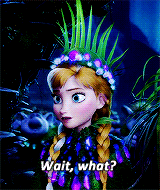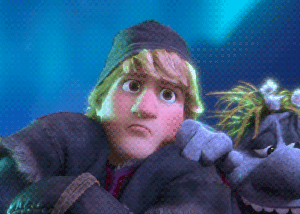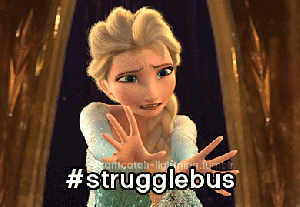Frozen has always been a mixed bag for me. There are some parts of the movie that I really love and others that are problematic and needed some work. The one that bothers me the most is the trolls, and their song, “Fixer-Upper.”
“Fixer-Upper” is a song that tries to come off as being about love and acceptance, but instead introduces some really uncomfortable messages that didn’t jive with me: 1) the way that the song ignores the agency of both Anna and Kristoff, and 2) the message that love can fix people.
Ignoring Anna and Kristoff’s Agency
The problem with the trolls is the way that they ignore the agency of characters, and this is clearest in “Fixer-Upper” when we see the way they entirely dismiss Anna’s feelings. I mean, look at the opening lines of the song:
What’s the issue, dear?
Why are you holding back from such a man?
The language here is just…ugh. First of all, the dear comes off as patronizing in this context. Second, there’s this very uncomfortable sense of shaming. “Why are you” is combative; it suggests that fault lies with Anna, and that she’s wrong for not being with Kristoff. The way that the trolls shame her for that is so rude and disrespectful that I can’t even deal.
(I’m Misty in this gif basically.)
The trend of ignoring Anna’s agency continues when Kristoff tells the trolls that Anna is engaged.
So she’s a bit of a fixer-upper
That’s a minor thing
Her quote ‘engagement’ is a flex arrangement
And by the way, I don’t see no ring
The term “fixer-upper” used for Anna suggests that her engagement with Hans is something that can easily be fixed. They disregard the validity of the relationship with excuses (“her quote ‘engagement’ is a flex arrangement” and “I don’t see no ring”) and in doing so, completely disregard Anna’s choices and agency. They’re basically saying: Anna’s decision holds no merit, because we say it doesn’t. They’re taking away from the merit of her decision and writing it off. We live in a society where women and their choices are written off so often that seeing this happen in context of the movie was super uncomfortable in a bad way.
And then this happens:
So she’s a bit of a fixer-upper,
Her brain’s a bit betwixt
Get the fiancé out of the way
And the whole thing will be fixed!
Side note for those of you who went “huh” at the word betwixt, like I did: betwixt means “between” so the trolls are likely referencing the love triangle between Hans, Anna and Kristoff (and Anna’s feelings for both guys) here.
This is a lot like the above stanza, where the trolls are disregarding the feelings of all three members of the love triangle. They’re dismissing Anna’s feelings. Calling her “betwixt” is like calling her “confused” which is super insulting in my opinion, because they’re saying she can’t trust her own feelings, so they should make a decision for her. Again, that disregard for Anna’s agency.
They’re disregarding Hans entirely: they’re willing to kill him or at the very least, get him “out of the way” in order to make Kristoff/Anna happen. Now keep in mind, the viewer doesn’t know that Hans is evil at this point. Neither do the trolls. For all we know, the trolls are going to take out some innocent guy just to make their shipping dreams a reality. That’s totally messed up.
And they’re also disregarding Kristoff’s feelings as well. Kristoff is clearly uncomfortable during the song, and the trolls repeatedly ignore that.
When the trolls first try and set Kristoff and Anna up, Kristoff interrupts and says:
“Can we please just stop talking about this? We’ve got a real, actual problem here.”
Kristoff is worried about Anna’s condition, obviously, but I think he’s also uncomfortable with his family trying to set him up with Anna when Anna is engaged to someone else. Kristoff’s regard for Anna’s feelings is in direct contrast to the trolls. While they don’t care what Anna wants, Kristoff cares greatly about what Anna wants and how Anna feels. He may have scoffed at Anna’s engagement at first, but it’s clear as the movie goes on that he cares greatly about how Anna feels and respects her feelings. Does he like her? Yes. But Kristoff is a great representation of how someone should handle a person they like having feelings for someone else: instead of whining or trying to get Anna to pick him, Kristoff respects Anna’s feelings and her relationship with Hans. He stands firm when the trolls keep pushing:
“Enough! She’s engaged to someone else, okay?”
Even with his feelings for Anna, he respects her relationship enough to defend it to his family when they keep pushing and harassing them. And later, he takes Anna back to the castle to Hans when she needs her act of true love, because he wants her to be happy. He respects her. I know I’ve said this word a lot, guys, but respect is really important. And the trolls completely disrespect Kristoff as well as Anna by ignoring their feelings about the matter.
There’s also the fact that they keep headlining Kristoff’s flaws, which while I understood they were trying to be upfront about him and mortifying in the way that family sometimes is, rubbed me the wrong way, because they treat his flaws as something to be fixed.
And that’s the ultimate problem with this song. “Fixer-Upper” promotes an incredibly unhealthy message: fixing people’s flaws with love.
Love Can Fix People? False.
Repeatedly, the trolls tell us that love can be used to fix a person. They reference it in terms of Kristoff’s flaws (“you can fix this fix-upper up with a little bit of love”) and they reference it again in terms of love in general (“the only fixer-upper that can fix a fixer-upper is true love”). This aggravates me.
Sending a message that love can fix people is horribly irresponsible. Think of how many people stay in bad relationships because they think that they can fix the other person. How often does that logic fail? A lot. Not everyone can be fixed with love, and it shouldn’t be someone’s responsibility to stay with someone else in order to fix them. Saying that love = fixing is putting the responsibility of fixing a person on someone else, when the only person who can fix you is you.
I’ve seen it suggested that the stanza about how “people make bad choices if they’re mad or stressed or scared” is about Elsa, and relates to Anna’s solution to helping Elsa, but this bothers me as well. It’s not Anna’s responsibility to “fix” Elsa. Only Elsa can control her powers and overcome her anxiety, and that weight shouldn’t be put on Anna. Neither should Anna “fix” Kristoff. 1) Kristoff doesn’t really need to be fixed (because he’s awesome). 2) Even if he did, that’s not Anna’s responsibility. Anna is with Hans at this point of the movie, and she loves him. She isn’t going to ditch him just because the trolls want her to date Kristoff and fix his flaws.
“But what about when the trolls say that people don’t really change, Mel? Doesn’t that mean that they don’t want Anna to change Kristoff in any way?”
Not exactly. Let’s take a look at the stanza, shall we?
We’re not saying you can change him,
‘Cause people don’t really change
We’re only saying that love’s a force
That’s powerful and strange
People make bad choices
If they’re mad or scared or stressed
This might be a good message if the trolls hadn’t spent the entirety of the song before this entirely contradicting it. The fact that the trolls spend stanzas before this criticizing Kristoff’s flaws and telling Anna that she can fix him up negates all of this. And yes, people make bad choices. That’s a good point, and points to Elsa and how a lot of her bad choices came from a place of fear. However, the two lines after this are entirely unforgivable.
Throw a little love their way
And you’ll bring out their best
I can see what the movie’s trying to do here. The story is trying to tie in that “love > fear” theme. But instead, the movie sends the message that love will fix people, because it will bring out their best. Now, if this was true, do we really think that we would have had Hans leave Anna for dead? If love supposedly brings out the best in people, wouldn’t Anna loving Hans have been enough to overcome whatever evil tendencies he had?
Now, as a counter-argument, you could say that Anna and Hans weren’t in love (since they’d just met like a day ago so it’s probably a crush more than anything else), but what about Anna and Kristoff? They’ve only known each other for about the same time as Anna and Hans, so that doesn’t exactly make them in love either. And what about familial love? Elsa and Anna have known each other their whole lives, and Anna’s love for Elsa hasn’t really fixed Elsa at this point. Neither did the love Elsa’s parents had for her. So how does this love force work? Do two people have to be in love to fix each other? Does it have to be romantic in nature? Does it need to involve sacrifice, like Anna’s act of true love at the end of the movie?
The trolls say that “love’s a force that’s powerful and strange” but how is love supposed to fix someone? They repeatedly insist that Anna can use love to fix Kristoff’s flaws (and hint to the viewer that Anna’s love can fix Elsa) but never back this up with any concrete evidence, making it an unsubstantiated claim.
Love doesn’t always change people, and love is not a fix-all. Throwing love someone’s way to bring out their best, or staying with someone to fix them, isn’t always going to do that. It’s irresponsible for Disney to suggest otherwise.
While “Fixer-Upper” had a positive motive, its underlying messages undermine it by being uncomfortable and unhealthy. It also leaves us with a question: is love really a fix-all? The reality is that no, it’s not.
What do you guys think of “Fixer-Upper” and its messages? Let us know in the comments!
Follow Animated Meta on Tumblr and Twitter. Have a happy Tuesday!
Cheers,
M&M








The trolls are basically older relatives. The aunts and uncles who wonder why you don’t have a wo/man in your life yet because you’re not getting any younger. They don’t care about what you want, they know better because they’re older and have more experience and you should listen to them. Of course, the trolls are able to take it a lot further because they’re their own society; they can get a wedding underway.
The trolls *should* listen to Kristoff and Anna… but they don’t, out of excitement. Kristoff has lived with them some thirteen years. And now, he can go back to his ‘world’; he’ll have a family. They’re so stuck on that point because Kristoff isn’t MEANT to spend sixty plus more years with them; he needs to go live a life beyond “my family are actual trolls”. This doesn’t make it *better*; nothing can make not listening to someone you care about better.
Their disregard for Hans to me, comes from the point of the fact that there is no proof of engagement. I know I’ve said things to my relatives that aren’t true to make them back off. Which in my opinion makes this even worse: they see they’re making Kristoff uncomfortable with their actions to the point he ‘makes up’ an engagement, and then they call him out on it: “her quote ‘engagement'” and “I don’t see no ring”.
The trolls went way too far in their zeal to see Kristoff back in the human world.
As for the love can fix people stanza… no, no it can’t. People are complex, love is not a cure all. However, I believe that when two people are in love, their love for the other person means they will endeavour to act so the other person is happy. If my boyfriend is unhappy that I keep going out with my girlfriends and we never have time just for us, then I will reduce my time spent with other people so that we can have time just for us. In a way, this could be “bringing out my best”.
This is a contrast, as you say, to Hans’ actions, and I think the mistake you make is that you’re assuming Hans ever loved Anna. Having seen the movie several times, I submit that Hans did not love Anna; he merely pretended to love her. At the end, in the classic villain reveals his plans scene, he admits he knew he had to marry into the throne somewhere and that he preferred Elsa as heir, but since no one was getting anywhere with her, Anna was the only choice. And Anna made it easy for him: she threw herself at him out of a desperation to be loved, agreeing to marry him without question. This just leaves Elsa’s death to arrange.
This planning shows malicious aforethought, in my opinion. And is not the plan that Hans, if he loved Anna, would come up with, again, in my opinion.
LikeLike
You do realize real message of the song is about Anna and Elsa, not Anna and Kristoff, right?
LikeLike
Well, technically the trolls do mean for it to be about Anna and Kristoff but neither take it seriously, apart from Anna realizing how it can be applicable to her sister. It’s pretty obvious the filmmakers intended viewers to make the Anna/Elsa connection since the whole film is ultimately about their relationship. Basically the trolls are that broken clock that’s unintentionally correct twice a day.
The song could also be taken as showing shade on Anna’s rushed engagement by showing just how ridiculous it is to rush into marriage in case viewers weren’t already raising their eyebrows.
Either way, the OP is taking the song too literally and out of the greater context of the film.
LikeLike
This is some college Freshman level analysis. The Trolls are not exactly the moral authority in the story — a point made by the filmmakers early on. After all, they were the ones who wiped memories and encouraged secrecy, setting in motion decades of pain. So for you to criticize their message is like writing a lengthy post about why Tamatoa is bad for wanting to be shiny.
LikeLike